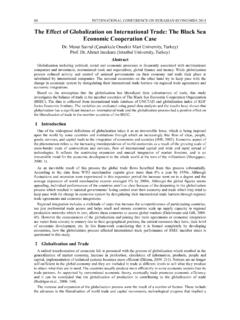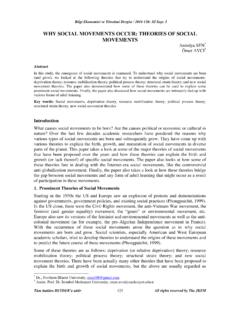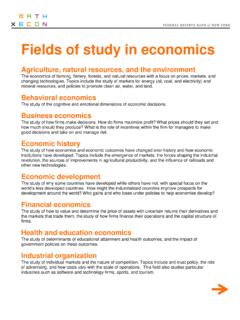Transcription of Teaching and Learning Issues in Mathematics in the ... - ed
1 Teaching and Learning Issues in Mathematics in the Context of Nepal Ram Krishna Panthi Teaching Assistant, Department of Mathematics Education Mahendra Ratna Campus Tahachal, Tribhuvan University, Kathmandu, Nepal Shashidhar Belbase Assistant Professor, Department of Mathematics and Statistics University College, Zayed University, Dubai, United Arab Emirates (UAE) Date: April 18, 2017 Abstract In this paper, we discussed major Issues of Mathematics Teaching and Learning in Nepal. The Issues coming from theories such as social and radical constructivism suggest that teachers are not trained to use such approach in Teaching Mathematics , and there is a lack of Teaching aids and materials and technological tools. The Issues related to social aspects are gender Issues , language Issues , social justice Issues , and Issues related to the achievement gap. The cultural Issues are related to the diversity of language and ethnicity.
2 The Issues related to political aspects are equity and access, economic status, pedagogical choice, and professional organizations and unions. The Issues related to technology include the technological skills, use of technology, and affordance. Finally, we suggest that all the stakeholders should pay attention to resolving these Issues by improving the curriculum, training teachers, resourcing the classroom with locally made and new technological tools. Keywords: Teaching and Learning Issues in Mathematics , Social Issues in Mathematics Education, Cultural Issues in Mathematics Education, Political Issues in Mathematics Education, Technological Issues in Mathematics Education, Mathematics Education in Nepal Introduction Nepal is a member state of the United Nations (UN) since (1955). The country has been trying to abide by the international treaties, agreements, and declarations of UN and its organizations in relation to human rights, basic and higher education, economy, and public health.
3 As a result, Nepal adopted the Education for All 2000 and Dakar Framework of Action (2000) (UNESCO 2015). The Curriculum Development Center (CDC) of Nepal also prepared and implemented a National Curriculum Framework for School Education in Nepal 2007. This framework speaks of various provisions of school education focusing globalization , modernization, decentralization, and localization of curriculum in the Nepalese context (CDC 2007, p. 1). The framework was based on the following contemporary Issues of school education in Nepal socio-cultural, curricular, educational (norms, values, life skills, employment), technological, linguistic, instructional, assessment related, research-based, and quality and relevancy based. The basis of curriculum development has outlined many important points including integrated, child-centered, basic education in mother tongue, inclusive, local need-based, Sanskrit as a foundation for Eastern knowledge base, IT supported, and life skill oriented (CDC 2007).
4 Despite Nepal s commitment to providing quality education in general and Mathematics education by ensuring equity and access, there are so many Issues of Teaching and Learning Mathematics in Nepalese context. Some of these Issues are related to theories , and others are practical in nature. These Issues are related to classroom management, ethnicity, lack of trained teachers, inequity, lack of Teaching aids and materials, lack of textbooks, lack of time for students, lack of clear objectives, gender Issues , and Issues of mathematical contents and pedagogy. In our understanding, most of the public schools in Nepal do not have proper management of the classrooms. They have an inappropriate size of classes, not inclusive seating arrangement, and there is also the lack of technology for Learning and Teaching Mathematics . There is a misuse of technological tools even if it is available.
5 Classrooms in Nepal are multicultural and multilingual in general because students come to the school from different cultural and linguistic background. This context resonates with what Gates (2006) expressed, "in many parts of the world, Mathematics teachers are facing the challenges of Teaching in multi-ethnic and multi-lingual classrooms containing - immigrant, indigenous, migrant, and refugee children, and if research is to be useful it has to address and help us understand such challenges" (p. 391). We agree with Gates' opinion that Mathematics classroom situation in Nepal is the same as stated above because multi-lingual and different ethnic groups have their own problems in a classroom context. Also, we have the classroom Issues related to internal refugees and migrants due to the ten-year conflict in the country and post-conflict political instability.
6 These Issues are creating challenges for us in Teaching and Learning Mathematics . The Mathematics curricula designed by experts and implemented by the government to all grade levels do not fit our culture. We teach foreign Mathematics . It has been imposed upon the teachers and students. We feel that it is western Mathematics that we are Teaching and Learning without considering the needs of students, diversity and values of our society, and norms of the eastern culture. In a similar way, Anastasiadou (2008) writes: The de facto multiculturalism (..) which now describes the Greek society, .. [which] continues to function with the logic of assimilation (..). In the field of education, the adoption of the policy of assimilation means that it continues to have a monolingual and monocultural approach in order that every pupil is helped to acquire competence in the dominant language and the dominant culture.
7 (Anastasiadou 2008, p. 2) We are blindfolded to accept the imposed theories and practices without considering the richness of social and cultural diversity, geopolitical complexity, and local knowledge system. The dominant monolingual and mono-cultural western education system are so pervasive that it has severely affected Teaching and Learning Mathematics in our country. In this paper, we have discussed theoretical Issues of Mathematics Teaching and Learning based on radical and social constructivism, social Issues , cultural Issues , political Issues and technical Issues and we have suggested some practical measures to address these Issues in Nepalese context. Theoretical Issues There are many theories and philosophies in Mathematics education. Radical and social constructivism are the two philosophies and theories that have been widely debated and discussed in the literature of Mathematics education (Belbase 2014).
8 The views of Mathematics such as Mathematics as a foreign subject, Mathematics as a collection of symbols, Mathematics as a meaningless subject, Mathematics as a body of pure knowledge, and Mathematics as an objective knowledge (Luitel 2009) have dominated the worldview of most of the math teachers and curriculum experts in Nepal. Hence, the subsequent action of Teaching and Learning and curricular practices in Mathematics have been severely affected by such worldviews. We would like to present some theoretical Issues of radical and social constructivism of Mathematics education in this section. The choice of these two dominant theories are based on contemporary debate on whether Learning Mathematics is an individual or social phenomenon and the nature of Nepalese social and cultural value system. Radical Constructivism We realized that students build their mathematical concepts of what they learn through active cognitive and adaptive process (von Glasersfeld 1995).
9 According to this perspective, students should be involved in critical reflection on Teaching and Learning Mathematics . The Teaching and Learning processes undergo through assimilation, accommodation, adaptation, and reconstruction (von Glasersfeld 1990). The students learn Mathematics through active construction of the meaning of concepts they learn through individual re-organization, re-presentation, and re-construction and social negotiation with peers, elders, and teachers (Belbase 2016). However, there are some major Issues of radical constructivism in Teaching and Learning Mathematics that arise from mathematically weak students, application of teacher-centered pedagogy, untrained teachers, the existing curricula, our diverse social and cultural context and general lack of hands-on resources for classroom practice.
10 In our understanding, the theory of radical constructivism focuses on the cognitive process of Learning and Teaching Mathematics which is entirely a mental process. For the success of Teaching and Learning Mathematics in the classroom, students are trained to go through individual and collective mental processes to make sense of concepts they learn and build upon them further concepts. However, it is challenging in our classroom Teaching and Learning due to large class size and limited or no classroom resources. We consider that mental actions and processes are mediated through what students and we (teachers) do in the classroom. Although constructivism has emerged as one of the greatest influences on the practice of education, our Mathematics teachers have not embraced constructivist-based pedagogy in Nepalese context.













